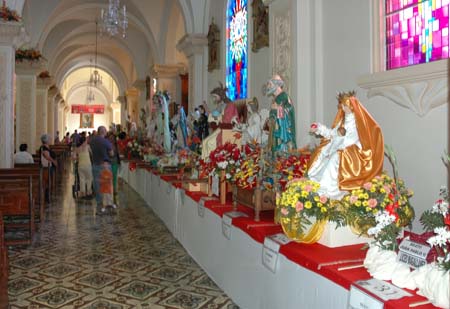Costa Rica Entertainment News – The Alajuela canton is making preparations for a big celebration in the name of its patron, Saint Raymond Nonnatus. On Friday, the residents elected the family which would take the place as head of the festivities. Participants have collected funds over the last three months; the winners of which were notified on Friday – an event which was further livened up with a dance by the group, Papel y Lápiz.
 As well as the novena of honor to Saint Raymond, which will take place every day, there will be a great range of family activities on offer to mark the occasion.
As well as the novena of honor to Saint Raymond, which will take place every day, there will be a great range of family activities on offer to mark the occasion.
This Sunday 24th saw a procession of townspeople in traditional herder costumes. The line was made up of some 260 pairs working their way through the parish towards the church.
“This year, we want to invite everyone and to say that we’re waiting for them in San Ramón with open arms, with a festival which is truly unique in its passionate and family-orientated nature”, said Father Greivin Hidalgo, Parish Priest of San Ramón, in a press release.
Great food and a lot of fun. As well as the typical moncheñas, you’ll find some of the famous home-cooked feasts in front of the church. Representatives from the different districts of San Ramón will each be providing a range of traditional meals. Some examples of what’s on offer are: picadillo, stuffed meats, rice dishes, grapefruit and honey and ginger beer.
The traditional Arrival of the Saints will take place on 30th August. As part of the event, different saints from a number of places around the country will come to visit San Ramón.
For the people in the town, this is one of their most highly anticipated festivals as it signifies the union between neighboring villages. The procession will begin at 10am, and customarily it sees at least 60 saints from other communities from across Costa Rica.
The images will then remain in the local church for a week.
The activities in honor of Saint Raymond will come to an end on the 2nd September, when they will do the ‘scraping of the pans’, a huge feast of all the dishes which the vendors have left, which is shared between all neighbors and guests of the community.
Translated from La Nacion by Leah Hendre

